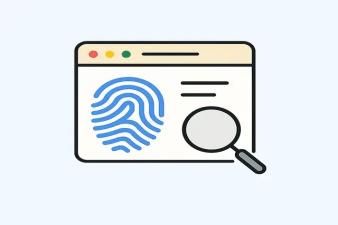Why U.S. Users Are Turning to Anti-Detect Browsers in 2025?


In the world of cross-border marketing, account bans are among the most common and serious risks. Whether you're selling products on Facebook or Shopify, or managing multiple ad accounts, you’re likely facing challenges such as:
- Stricter advertising policies
- Login verification triggered by inconsistent IP addresses
- Browser fingerprint tracking
- Multiple account activities flagged as “suspicious behavior”
These challenges have paved the way for anti-detect browsers to quickly gain traction among cross-border e-commerce sellers. They enable stealth operations, account isolation, ban prevention, and sustainable business growth.
🌐 What Is an Anti-Detect Browser?
Anti-detect browsers are designed specifically for privacy protection and multi-account management. They can:
- Manage multiple isolated browser environments, each acting like a separate device
- Prevent platforms from detecting, tracking, or identifying device fingerprints
- Simulate users from different countries/regions using proxy IPs
- Spoof browser fingerprints such as Canvas, WebGL, fonts, language, and device type
💼 Usage Scenarios: How U.S.-Based Dropshippers Use Anti-Detect Browsers
1.Running Multiple Independent Stores (Shopify / Amazon)
If you're managing multiple Shopify stores or different product-brand combinations, platforms may flag your accounts as being operated by the same person. This could lead to mass bans, severely impacting your business. Anti-detect browsers help isolate logins, ensuring each store runs in a separate browser environment — significantly reducing the risk of bans.
2.Managing Multiple Ad Accounts (Facebook / TikTok / Google)
Many cross-border sellers run multiple ad accounts for A/B testing or diversifying ad strategies. But if these accounts log in from the same device or IP, they’re often flagged for “suspicious activity.” Anti-detect browsers allow you to:
- Assign a unique IP and browser fingerprint to each account
- Avoid detection, suspicious behavior flags, or mass bans
- Efficiently and safely manage 50–100 (or more) ad accounts simultaneously
3.Simulating Different U.S. Users for Local Testing
By switching proxies and browser environments, sellers can simulate users from different U.S. states. This is useful for checking local ad visibility, adjusting bids, or testing geo-targeted campaigns.
🧪 Anti-Detect Browser vs Regular Browser vs Incognito
| Feature | Regular Browser | Incognito Mode | Anti-Detect Browser |
|---|---|---|---|
| Multi-profile support | ❌ | ❌ | ✅ |
| Fingerprint spoofing | ❌ | ❌ | ✅ Full (canvas, WebGL, etc.) |
| IP + timezone spoofing | ❌ | ⚠️ Partial (with VPN) | ✅ |
| Cookie isolation | ❌ | ✅ | ✅ Stronger |
| Use for multi-accounting | 🚫 Risky | ⚠️ Risky | ✅ Safe |
| Best for dropshipping | ❌ | ⚠️ | ✅✅✅ |
🔥 Recommended: Most Commonly Used Anti-Detect Browser for U.S. Cross-Border Sellers in 2025
MostLogin Anti-Detect Browser supports multi-account management and browser fingerprint spoofing. With isolated browser environments, proxy IP management, and cookie/local storage separation, it helps users simulate multiple real user devices — effectively preventing account linkage and bans.
Key Features of MostLogin:
Advanced fingerprint spoofing (Canvas, WebGL, Audio, language, fonts, and more)
Supports global residential proxies, fully compatible with popular dropshipping platforms
Simple interface, affordable price, and strong operability
❓ FAQ: Anti-Detect Browsers for U.S. Dropshippers
Q1:Does using an anti-detect browser guarantee my account won’t get banned?
Not necessarily. While it significantly reduces the risk of bans, it's not foolproof. Always follow platform rules and avoid malicious ad behavior or illegal activities.
Q2:Do I still need a proxy when using an anti-detect browser?
Yes. Anti-detect browsers mainly spoof the browser environment, but IP addresses still need to be changed through proxy services (residential proxies are highly recommended) to simulate different geographic locations.
Q3:Is it legal to use an anti-detect browser in the U.S.?
Yes, it's legal. As long as it's not used for fraud or illegal purposes, anti-detect browsers are legitimate privacy tools with wide-ranging legal applications.
Q4:Which anti-detect browser is best for beginners?
We recommend MostLogin – it features a clean interface, multilingual support, rich functionality, and great value for money.
📝Summary: Don’t Let Account Bans Destroy Your E-Commerce Business
In 2025, as competition in the cross-border e-commerce market intensifies, major platforms are continuously strengthening their risk control measures and detection capabilities. A reliable anti-detect browser has become one of the core competitive advantages for dropshipping businesses. Whether you’re testing ads, collaborating with a team, or managing multiple stores, a powerful anti-detect tool helps you safely expand your operations and maintain steady profits.
🚀 Best MostLogin Anti-Detection Browser
MostLogin: A professional anti-detection browser with full-dimensional fingerprint camouflage and multi-account isolation, ensuring efficient and secure cross-border operations.
If you have any questions, please Official Help Documentation


